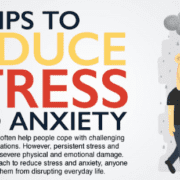Stress and anxiety often help people cope with challenging or dangerous situations. However, persistent stress and anxiety can cause severe physical and emotional damage. With the right approach to reduce stress and anxiety, anyone can prevent them from disrupting everyday life.
What Is Stress?
Stress refers to the body’s natural reaction to change. Stress frequently helps people stay alert and motivated, but prolonged stress can cause physical and emotional problems.
What Is Anxiety?
Anxiety is the body’s natural response to stress, and refers to a feeling of fear or apprehension about the unknown. If anxiety persists for a longer than expected time, and/or causes undue disruption to quality of life, an individual may be dealing with an anxiety disorder.
What Causes Stress and Anxiety?
Common causes of stress and anxiety include:
- Traumatic events such as the loss of a loved one or one’s job
- Major life changes such as moving or getting married
- Chronic illness or injury
- Depression, guilt, and/or other emotional problems
- Fear or uncertainty about finances and/or work
- Drugs that contain stimulants
- Regular caffeine and/or alcohol consumption
What Are the Symptoms of Stress and Anxiety?
Common symptoms of stress and anxiety include:
- Agitation
- Low self-esteem
- Depression
- Headaches
- Nausea
- Insomnia
- Body aches and pain
- Dry mouth
- Constant worrying
- Nervous behaviors like fidgeting or nail-biting
Are Stress and Anxiety Preventable?
There is no telling when a situation will cause stress and anxiety. Fortunately, there are many ways to reduce stress and anxiety, including:
- Maintain a Healthy Diet: Consume whole grains, fruits, and vegetables that provide the body with magnesium, zinc, and other nutrients to help minimize stress and anxiety.
- Get Restful Sleep: Create a comfortable sleep environment to make a good night’s sleep a regular occurrence and lower the risk of stress and anxiety.
- Exercise Regularly: Walk, run, or engage in other forms of aerobic exercise for at least 20 minutes a day, three days a week, to improve mood and limit tension.
- Practice Mindfulness: Enjoy yoga, meditation, and other mindfulness activities to focus on the present and relax the body, mind, and spirit.
- Explore Treatment Options: Meet with medical professionals to evaluate the use of psychotherapy, medication, and other treatments to address stress and anxiety.
Infographic: Tips to Reduce Stress and Anxiety
Schedule a Stress and Anxiety Treatment Consultation with Achieve Concierge
At Achieve Concierge, our expert clinicians work closely with each patient to provide a personalized stress and anxiety treatment tailored to their needs. To learn more or to schedule a free treatment consultation with Achieve Concierge, please contact us today at (619) 393-5871.




